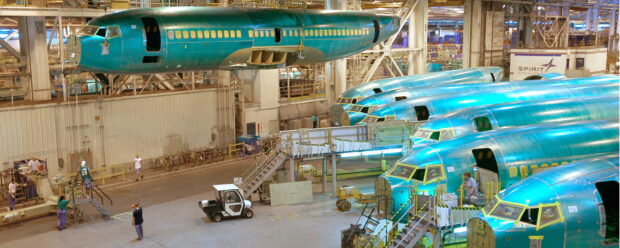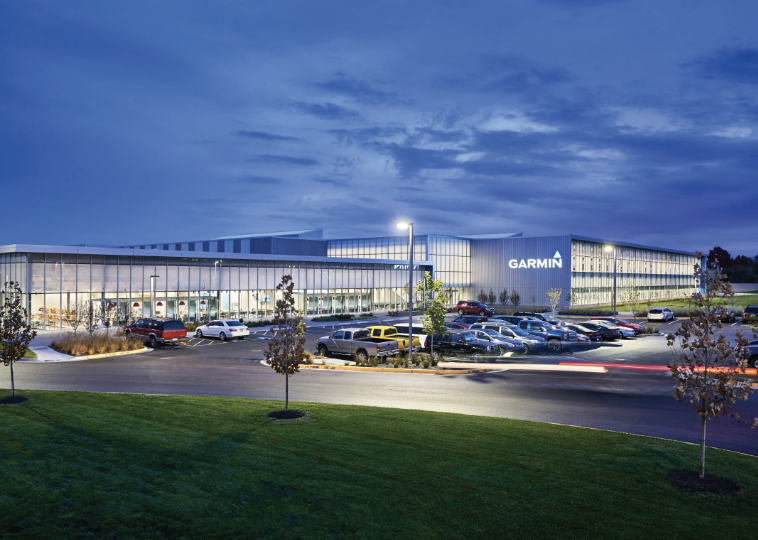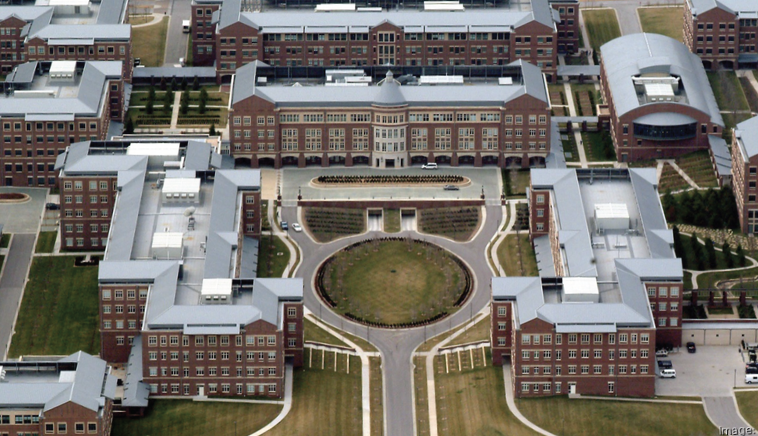HOME | ABOUT US | MEDIA KIT | CONTACT US | INQUIRE
HOME | ABOUT US | MEDIA KIT | CONTACT US | INQUIRE
Major business developments and events in Kansas over the past half-century have placed the state in the spotlight in countless ways, from commerce to collegiate athletics.

PUBLISHED NOVEMBER 2024
The final chapter in the history of business in Kansas over the past few years would have an almost ironic sense of how things can come full circle. Earlier this year, The Boeing Co. agreed to buy back Wichita’s Spirit AeroSystems for $4.7 billion in stock.
This is the same Boeing that had divested itself of its commercial aviation division in 2005, sending shock waves through Wichita, where some 20,000 people produced fuselages for some of the company’s most popular passenger jets. That sale to Onex led to the formation of Spirit, which—thankfully, for the folks in the Air Capital of the World—continued to roll out planes and retain its status as the biggest employer in Wichita.
So Boeing’s back in town—or will be, officially, when the deal formally closes in 2025.
The five decades leading to that exclamation point have been eventful ones in Kansas, where billion-dollar acquisitions—either inflation-adjusted or in real dollars—have been commonplace during that half-century.
The Internet has existed for only half that time period, so we present the following with a caveat: A comprehensive compilation of those deals would require armies of historians poring over library microfiche and volumes of dusty journals. It’s possible we’ve overlooked some (and we invite you to alert us to any, for future reference).
Here, though, are some of the most significant deals through the years:
In 1983, a century after its founding, Kroger merged with Hutchinson’s Dillon Companies to expand its reach in grocery sales. The deal had a maximum value of $750 million ($2.42 billion today), and while there was a bit of a civic sting in Hutchinson with the loss of a local heavyweight, the Dillon’s brand remained intact in stores across the state.
In October 1985, Wichita saw the groundbreaking for the Epic Center, which became the tallest building in Kansas when it was completed in 1987. The 22-story building, at 385 feet in height, was built to attract businesses to Downtown Wichita and was originally envisioned as a two-tower signature development. Plans for the second tower were soon abandoned.
That same year, Wichita was rocked with the sale of its biggest hospital, Wesley Medical Center, a 760-bed giant that had been founded by the Methodist church. The sale to for-profit HCA of Nashville initially created some civic unease, which quickly subsided as the new owners reaffirmed a commitment to developing Wesley as a teaching hospital.
That year also saw the establishment of Equity Bank, which is now the state’s fourth-largest in terms of assets, at $5.2 billion.
In November 1986, Kansas voters delivered a resounding 64-36 approval for the state to create a lottery. Authorized by the Legislature the following year, it has since generated more than $7.5 billion in ticket sales, with $2.1 billion going to fund various state programs.
One of Wichita’s biggest entrepreneurial success stories saw its final chapter written in 1987, when hometown Rent-A-Center—which had become the nation’s largest rent-to-own enterprise for appliances, TVs, and other goods, was sold to a British company, Thorn EMI, for $594 million. The proceeds from that allowed founder Tom Devlin to fund multiple other ventures, including his founding of Flint Hills National Golf Club.
From golf to basketball: 1988 produced perhaps the most consequential year in the history of basketball at the University of Kansas. First, the Jayhawks won the NCAA Tournament to claim their first national championship since 1952. Soon after, the architect of that team, Coach Larry Brown, left for the pros, and KU hired Roy Williams, who would re-establish the program as a perennial Big 8/Big XII champion and frequent No. 1 seed in the postseason.
A year later and 90 miles to the west, K-State approximated in a football hire what KU had done in basketball: It hired a comparative unknown, Bill Snyder, to build something out of what was the college football program with more losses than any other in the U.S. In two stints over the next 30 years, he led the Wildcats to three Big XII championships, major bowl berths, and, on a couple of occasions, No. 1 ranking in the polls, putting the state squarely on the college football map.
 Also in 1989, two electrical engineers in the Kansas City area founded a company to make personal GPS devices for cars. Gary Burrell and Min Kao launched Garmin, which went public in 2000 and today remains one of the biggest employers in the Kansas City region, with global revenues of $5.23 billion.
Also in 1989, two electrical engineers in the Kansas City area founded a company to make personal GPS devices for cars. Gary Burrell and Min Kao launched Garmin, which went public in 2000 and today remains one of the biggest employers in the Kansas City region, with global revenues of $5.23 billion.
Changes looming in the aircraft manufacturing sector became more evident in 1992 when Rhode Island-based Textron acquired one of Wichita’s Big Four plane-makers, Cessna Aircraft Corp., for $600 million. A little more than a decade later, Textron brought its checkbook back to town in 2014 to snap up another of the key aviation employers, Beechcraft. They remain part of that conglomerate today, operating as part of Textron Aviation.
In perhaps the most visible display of public policy’s impact on development, the Kansas Legislature authorized the use of a new tool in 1993, the sales tax and revenue bond program. Later tinkering with that program allowed Wyandotte County’s use of STAR bonds to finance the Kansas Speedway and Village West, sparking an economic boom that continues today in what had been the poorest of the state’s 105 counties.
Big changes came to the banking realm in 1996, when St. Louis-based Boatmen’s completed its acquisition of Fourth Financial Corp.’s Bank IV, an all-stock deal valued at $1.2 billion. At the time, Bank IV was far and away the biggest bank in both the Wichita market and No. 1 statewide, with $5 billion in assets and more than $4 billion in deposits. Boatmen’s itself was acquired by NationsBank then it was acquired by Bank of America, which sill dominates the Wichita market.
A long-running legal dispute that had fascinated Wichitans as a local issue and business observers nationwide took a turn toward resolution—but just a turn—in 1998, when a federal jury ruled that Charles and David Koch of Koch Industries had not defrauded their two brothers, Bill and Fred, who claimed they were owed $339 million more than they received after selling their interests in the company in 1983.
The biggest change in a health-care market undergoing wrenching change came in 1998 when the financially struggling, state-controlled University of Kansas Hospital was set free to determine its own fate as an independent health authority. From a middling ranking among the Kansas City region’s biggest hospitals, the leadership has leveraged an intense focus on patient satisfaction and improved outcomes to become the No. 1 facility in the state’s most populous region. Last year, revenues for the health system hit nearly $15.5 billion.
In May of 1999, construction began on the $225 million Kansas Speedway in Village West, a project that put the Sunflower State into the NASCAR racing circuit when it opened in 2001. That continued to spark nearby development, including what is now Children’s Mercy Park, the stadium that is home to the pro soccer franchiser, Sporting Kansas City. That area also has been mentioned as a possible new home for the Kansas City Royals and Chiefs.
Under Charles Koch’s watch as CEO, Koch has long had a two-pronged approach to growth, organic and acquisitions. The latter approach produced one of the biggest add-ons in company history in 2004, when it bought textile maker Invista from DuPont for $4.2 billion, further solidifying its place in various industry supply chains.
In the emerging life-sciences realm, Quest Diagnostics agreed in 2005 to drop $934 million on the acquisition of Lenexa’s LabOne, which had 3,100 employees providing health screen and risk-assessment services for insurance companies.
 That was also a pivotal year in telecom, as Overland Park’s Sprint Corp., one of the biggest employers in the state, agreed to acquire Nextel Corp. of Virginia for $36 billion. The deal, which sought to unify two different communications platforms under one brand, proved disastrous for Sprint and is regarded by business analysts as one of the most ill-advised mergers in U.S. history.
That was also a pivotal year in telecom, as Overland Park’s Sprint Corp., one of the biggest employers in the state, agreed to acquire Nextel Corp. of Virginia for $36 billion. The deal, which sought to unify two different communications platforms under one brand, proved disastrous for Sprint and is regarded by business analysts as one of the most ill-advised mergers in U.S. history.
As a national recession set in during 2007, the seeds were being sown for a full-blown financial crisis in 2008. In Kansas, that would produce significant change with two of the biggest bank failures in the state’s history: Columbian Bank & Trust Co. of Topeka (with $742 million in assets) and TeamBank of Paola (with $669.8 million in assets). They were big, but they weren’t alone. The crisis also claimed First National of Anthony, First Bank of Kansas City, Solutions Bank, Thunder Bank of Sylvan Grove, Security Savings of Olathe, and in short order, Hillcrest Bank, First National Bank in Olathe, Heartland Bank, and smaller, rural community banks in Argonia and Almena.
As banking was being upended, Kansas scored a major victory in the emerging life-sciences sector in 2008. The Department of Homeland Security announced plans to replace the old Plum Island Animal Disease Center in New York with a high-security mainland facility to study various lethal pathogens. The campus of Kansas State University emerged as the site for the proposed $1.14 billion National Bio- and Agro-Defense Facility, which is now up and running in Manhattan.
In the aftermath of the Nextel deal, Sprint spun off its local phone service under the Embarq brand in 2006, with the new organization merging into CenturyTel three years later. That created CenturyLink (now Lumen Technologies), serving more than 2.1 million broadband customers, more than 440,000 video subscribers and approximately 7.5 million access lines in 33 states.
In 2013, Sprint’s financial struggles drove it into the arms of Japan’s Softbank Corp., which acquired a majority interest in the telecom giant for $21.6 billion. That set the stage for a couple of key developments in the years to come. In 2019, Sprint sold its massive Overland Park campus for nearly $251 million to Wichita-based Occidental Management, which rebranded that sprawling office site as Aspiria. Then came Sprint’s eventual departure from the list of major Kansas City companies in 2020, when word came that it was being acquired by T-Mobile for $26 billion.
Great Plains Energy of Kansas City, parent of Kansas City Power & Light, had tried for years, without success, to secure a merger with Topeka-based Westar Energy. At times, the offer was simply rebuffed on business grounds; regulatory barriers thwarted other overtures. Until 2018, that is, when the two were able to come to terms in a deal valued at $15 billion. The offspring of that union, Evergy, serves more than a million customers in Kansas and Missouri.
The biggest economic development deal in Kansas history came in 2022 when Gov. Laura Kelly confirmed that Panasonic Energy’s North American division would build a $4 billion plant in De Soto to produce batteries for electric vehicles. The plant, now scheduled to open in 2025 with 1,000 employees, is eventually projected to have 4,000 workers.
That wrapped up a good year for Kelly and the state in development terms; in April, the state secured a commitment from Scorpion Biological Services to invest $650 million in building a 500,000-square-foot biomanufacturing facility in Manhattan. Preliminary estimates called for the creation of 500 high-paying jobs by 2030, developing vaccines to address global biological threats.
Two of the biggest real estate developments in the state’s history—both in Overland Park—moved ahead in 2023, where work continued on the $1 billion Bluhawk project, and groundbreaking took place on a $2 billion multi-use project on a site that formerly was home to Brookridge golf course. Each is expected to continue the growth that has made the city the economic engine of a county that is, in turn, the economic engine of the state.
Big doings in the Wichita area are also afoot. In 2023, Integra Technologies said it would invest $1.8 billion in a 1 million-square-foot expansion of its outsourced semiconductor assembly and test operations. Once at capacity, it will employ an additional 2,000 people, with a projected 3,161 additional jobs created by suppliers and adjacent businesses.
This past summer, the near suburb of Park City saw the groundbreaking for Champtown Addition, a $500 million mix of commercial projects that will include a 180-room hotel, an estimated 132,000 square feet of retail space, plus baseball and softball fields, along with a 78,100 square-foot aquarium and a butterfly conservatory of 20,000 square feet.